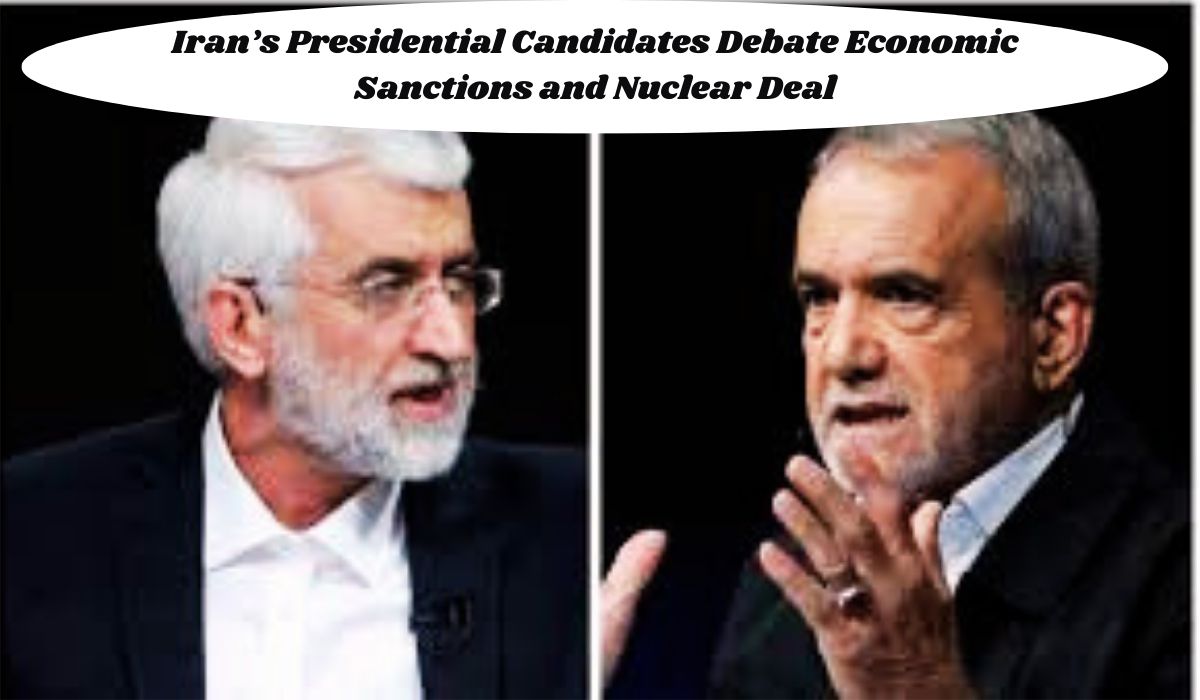Iran’s Presidential Candidates Debate Economic Sanctions and Nuclear Deal in 2024!

As Iran prepares for a critical runoff presidential election, candidates Masoud Pezeshkian and Saeed Jalili are debating key issues like economic sanctions and the nuclear deal. The outcome will determine who succeeds the late President Ebrahim Raisi.
Introduction
Iran is facing a significant presidential election. Candidates Masoud Pezeshkian and Saeed Jalili are debating how to handle economic sanctions and the nuclear deal with world powers. Their differing views could shape its future policies and economy.
Impact of Economic Sanctions
Pezeshkian’s Perspective
- Economic Hardships: Pezeshkian, a reformist, highlighted how Western sanctions have hurt Iran’s economy, leading to 40% inflation and rising poverty.
- Social Issues: He pointed out that many Iranians are struggling, with some resorting to begging.
- Economic Plan: Pezeshkian promises to work on lifting sanctions and repairing the economy.
Jalili’s Perspective
- Critique of Sanctions: Jalili, a hard-liner, criticized the U.S. for not honoring its commitments and stressed the need for a strong stance against Western policies.
- Economic Strategy: He proposed supporting the stock market and local industries, though details on funding were vague.
Reviving the Nuclear Deal
Background
- 2015 Agreement: Iran struck a nuclear deal in 2015 to limit uranium enrichment in exchange for lifting sanctions.
- Withdrawal by the U.S.: In 2018, President Trump withdrew from the deal, reinstating harsh sanctions.
Pezeshkian’s Approach in Iran’s Parliament
- Negotiation Plan: Pezeshkian advocates for discussing a new plan with the parliament to revive the nuclear deal and find alternative solutions.
- Need for Flexibility: He believes that no government can thrive under strict sanctions, implying a need for pragmatic diplomacy.
Jalili’s Approach
- Staunch Opposition: Jalili has always opposed the 2015 nuclear deal and demands the U.S. fulfill its commitments before Iran makes concessions.
- Negotiation Stance: He pledged to resume talks but from a position of strength, ensuring Iran’s interests are safeguarded.
Economic Promises
Common Proposals – (Stock Market)
- Reviving the Economy: Both candidates aim to boost the economy by supporting local industries and the stock market.
- Energy Subsidies: They propose providing energy subsidies to help the poor.
- Auto Industry: Both support importing cars while strengthening its domestic auto sector.
Challenges
- Funding Sources: Neither candidate has clearly explained how they will finance these initiatives.
The Election Context
Runoff Election
- Reason for Runoff: Iran will hold a runoff election because no candidate received a majority in the previous round.
- Low Turnout: Only 39.9% of eligible voters participated, with over 1 million ballots rejected, reflecting voter dissatisfaction.
Candidates’ Backgrounds
- Pezeshkian: A cardiac surgeon with a reformist agenda focused on lifting sanctions and economic repair.
- Jalili: A former nuclear negotiator known for his hardline views and reputation as the “Living Martyr” due to his war injury.
Conclusion
The upcoming runoff election in Iran will determine the country’s approach to handling economic sanctions and the nuclear deal. Masoud Pezeshkian and Saeed Jalili offer contrasting visions, with Pezeshkian advocating for pragmatic diplomacy and economic repair, while Jalili emphasizes a strong, uncompromising stance. The election’s outcome could significantly impact its international relations and domestic policies.
References
- Al Jazeera. “Iran’s presidential candidates debate economic sanctions and nuclear deal ahead of July 5 runoff.” Al Jazeera.
- Reuters. “Iran’s election: What you need to know about the candidates and their plans.” Reuters.
- BBC News. “Iran presidential candidates clash in a heated debate over economy, sanctions.” BBC News.
This article simplifies and elaborates on the key issues discussed by the Iranian presidential candidates, providing a structured and clear understanding of their positions on economic sanctions and the nuclear deal.


